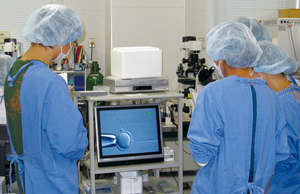Sep. 27, 2013 RIKEN Places Biology
Meeting researchers' needs worldwide
The BioResource Center in Tsukuba not only offers the widest selection of high-quality biological experimental materials in the world but also serves a unique role in training new experts in the field.
 © 2013 RIKEN
© 2013 RIKEN
Prior to 2001, there was no central facility in Japan to manage, maintain and supply bioresources. Scientists had to rely on overseas sources, resulting in an outflow of research funds and intellectual property. Furthermore, bioresources were produced in various laboratories with no common protocol. Stringent quality control was lacking, which led to poor reproducibility in results. RIKEN recognized the need for a guaranteed supply of high-quality bioresources for both academic and industrial research. In 2001, it established the BioResource Center (BRC) in Tsukuba to fill this gap.
The BRC is a centralized institute that collects, preserves, distributes and develops bioresources for researchers in Japan and around the world. Unlike other repositories that tend to specialize in one type of material, the BRC handles a variety of bioresources within five divisions: experimental animals, plants, cell lines, genetic materials and microbes. The BRC is a global distributor of cell lines, including the human induced pluripotent stem (iPS) cells established by Nobel Laureate Shinya Yamanaka.
Presently, the BRC has an annual budget of 3 billion yen and employs 400 staff members, including 87 researchers, 81 technical specialists, 80 agency workers and 109 part-time staff. The center fulfills around 16,000 bioresource requests annually, contributing to studies that are the basis of over 1,000 publications and 100 patents per year. In addition, the center offers training courses, summer schools and seminars for undergraduate and postgraduate students and early-career researchers to instruct them in the proper handling and use of bioresources. Together with the Model Animal Research Center of Nanjing University, China, the BRC co-organizes a short educational program for young scientists, which focuses on mouse genetics and related experimental techniques. The center also runs a Joint Graduate School Program with the University of Tsukuba and a similar international program with the National Yang-Ming University in Taiwan.
The BRC plans to further improve its handling of bioresource-related information and databases as well as to explore efficient ways of disseminating the materials. The center also creates novel bioresources, such as those derived from genomics research, to cater to the evolving demands of the scientific community. Guided by its founding principles of ‘Trust, Sustainability and Leadership,’ the center is committed to providing an even wider array of high-quality bioresources for research and development that address issues of public concern such as health, environment, energy and food. In doing so, the BRC aims to become one of the foremost centers of excellence for biological materials, improving the quality and reproducibility of research worldwide and taking RIKEN’s reputation to new heights.
